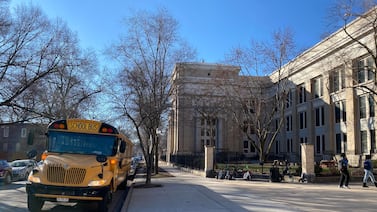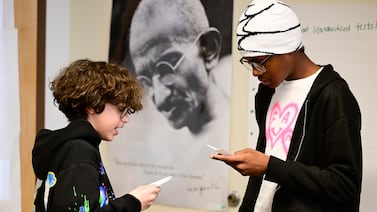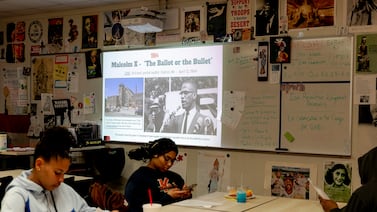After the State Board of Education dismissed her three school safety proposals, member Nikki Snyder stormed out of the meeting Tuesday morning.
It was the second time in five months one of Snyder’s proposals on safety measures in response to the Oxford school shooting was rejected by the board.
“The cowardice of this board is disgusting,” she said as she left.
Snyder, a Republican, introduced three resolutions to urge lawmakers to create a statewide emergency response plan, remove protections shielding public school officials from legal liability, hold staff accountable for lapses in safety, require annual school safety inspections, and create a database of student deaths and injuries, among other measures.
“The board shouldn’t exist if it’s not impacting the safety of our students,” Snyder said in a phone interview after she left the meeting.
Only Snyder and Tom McMillin, the other Republican on the eight-member board, voted in favor of discussing all three resolutions.
The members of the majority-Democratic board who voted against adding the proposals to the agenda said they care about school safety, but they either needed to do more research on the issues or wanted to wait to support related legislation to be proposed. Some members said they had already passed resolutions on safety issues. The board is an elected body that does not have the power to pass laws, but is expected to provide recommendations to legislators.
“Shame on you for saying that we don’t have urgency when we’ve continuously promoted resolutions and been out advocating for safe schools,” said Board President Pamela Pugh, a Democrat, to Snyder at one point in the meeting.
Three parents whose children attended Oxford High School in November 2021 when a 15-year-old killed four students and injured seven others decried the Michigan Department of Education and the board for not taking up the resolutions.
“You put Oxford High School students, staff, and families in your rearview mirror and you continue to refuse to see us,” said Renee Upham, whose son survived the mass shooting. “You are dishonoring them and the institution that you represent.”
An independent report on the shooting released in October found multiple failures by school officials to take steps to prevent the killings.
On Tuesday, the parents of the Oxford shooter were both sentenced to at least 10 years in prison for their failure to take steps to prevent their son from carrying out the shootings.
Civil suits were filed against Oxford Community Schools and several Oxford staff members. Last year, a circuit court dismissed a claim against the district and its employees due to government immunity. Litigation is still ongoing in some of the cases.
One of Snyder’s resolutions said the Oxford shootings could have been prevented if best practices in prevention were followed, echoing the findings of the independent report. The resolution would have encouraged the implementation of a statewide emergency operations plan, making independent third-party investigations of student injuries or deaths mandatory, and making schools and staff liable for negligence that leads to lapses in school safety. It also would urge the legislature to amend the state’s Freedom of Information Act to remove blanket exemptions that prevent the public from reviewing emergency plans, among other measures.
Another of Snyder’s resolutions says that Michigan students are put at risk of violence, injury, and discrimination because existing rules on how schools can use seclusion and restraint are not enforced in schools. It would urge the legislature to mandate state reporting on instances of seclusion and restraint, create state compliance oversight, create consequences for noncompliance, and change laws to make schools and employees liable for violating the laws.
Snyder also introduced a resolution to urge legislators to pass Liliana’s Law, a bill that has been introduced four times after a 3-year-old died from being crushed by a recalled folding table in 2017 at a Dearborn Heights Head Start program. The bill would require annual safety inspections of all schools. The resolution also encourages the lawmakers to pass a bill that would create a database of student deaths and injuries in public schools.
Board Member Tiffany Tilley, a Democrat, said that she believes resolutions are more effective in informing the legislature when the board has time to discuss issues at length and have an “informed position.”
“I think that we all need to understand that we are not legislators,” said Tilley. “We operate in a different capacity.”
Marshall Bullock, another board member and a Democrat, agreed and said the board and its legislative committee had not yet discussed some of the issues.
“While all of these have merit, I think they are put together in a haphazard way and they are definitely not thoughtful, vetted, clear, or concise,” he said.
On Monday, Snyder held a press conference with the mother of the girl who died in Dearborn Heights, parents of two Oxford shooting victims, and the father of a boy injured while being restrained in his school. She said their input was given on all of her proposals.
“All of these parents are saying the same things – that schools aren’t safe,” said Snyder.
In November, Snyder introduced a resolution calling for more training requirements for public school staff to prevent violence and more accountability for school employees and administrators for safety lapses. The board voted against taking up the proposal, saying they would consider it later after more research.
Pugh noted Tuesday that she voted in support of Snyder’s previous resolution related to an emergency operation plan. The board president said she expected that issue to come up in the legislative committee by now and that she will push it forward to the committee again.
After the public comments, Tilley said that as a survivor of a brother lost to gun violence, she deeply cares about safety issues.
“The resolutions are us coming together in our voice saying to the legislature that we want to see laws passed,” she said. “We just need time to do that. Nobody is saying that we’re not gonna do anything.”
Snyder expressed frustration during the meeting when state Superintendent Michael Rice reminded her that presenters, including a group of students set to talk about a pilot AP African American Studies course, were waiting to address the board.
“You’re trying to have more presentations about things that are not keeping kids safe and not educating them,” she said. “I’m fully aware of what we have done since the seven years I have sat on this board. Yes, let’s get to those presentations that aren’t keeping our kids safe and educating them. That’s important.”
A presentation on school safety and student mental health initiatives from the MDE and public safety officials took place after Snyder left.
The presenters discussed their vision for a comprehensive school mental health system as well as existing safeguards like tip lines, regularly updating emergency plans, and partnerships with law enforcement.
Snyder told Chalkbeat she didn’t regret any of the comments she made to the board.
“I think the cowardice of the way the board is handling these things is disgusting, and I feel no shame in saying that out loud,” she said.
Snyder did not return to the meeting. She said she was willing to discuss her proposals at the meeting next month.
“These resolutions are blueprints on how to move forward,” she said.
Hannah Dellinger covers K-12 education and state education policy for Chalkbeat Detroit. You can reach her at hdellinger@chalkbeat.org.







